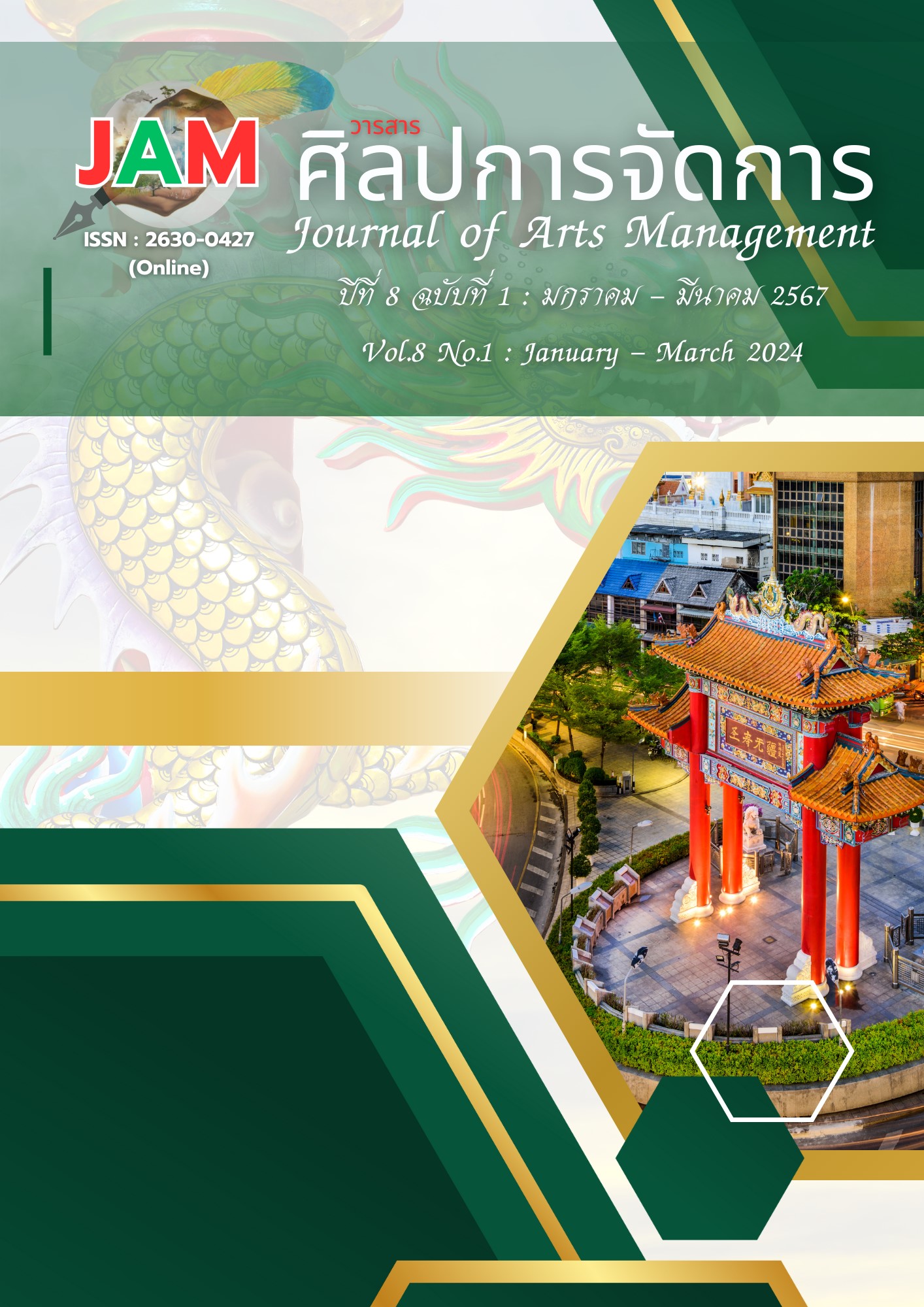Knowledge of Occupational Skills of Youth Based on Community Identity with Royal Science, Island Area, Satun Province
Main Article Content
Abstract
This research aims to 1) study the knowledge and occupational skills of youth based on community identity with royal science, the island area, and Satun Province, and 2) study the process of developing the occupational skills of the youth. This qualitative research determines the main group of qualitative informants by purposive selection in 11 communities in the island area, Satun Province. It is a field study conducted to study the wisdom and knowledge in the community that can lead to the development of occupational skills that are the identity of the community, according to King's science. An in-depth interview was carried out with representatives of villagers in 11 communities, with 2 representatives from each community (totaling 22 participants), along with a focus group discussion with community leaders to organize the knowledge system of vocational skills and study the needs of the process of developing the vocational skills of youth. Qualitative data analysis was performed using content analysis.
The research findings revealed that 1) the study of knowledge and occupational skills of youth based on community identity with royal science in the Satun Province island area in connection with community context, community identity, local wisdom, and living problems led to the identification of three main occupational groups: 1) product production utilizing local resources; 2) fishermen; and 3) tourism. These occupational groups reflect the local identity and culture of the island community and are integral to their way of life; and 2) the results of the study of the process of developing the vocational skills of youth based on community identity with royal science in the island area Satun Province. Knowledge management using the community as a base consists of four steps: 1) determine knowledge connection issues; 2) gather in groups to extract lessons and exchange knowledge; 3) summarize knowledge; and 4) transfer knowledge back to the community.
Article Details

This work is licensed under a Creative Commons Attribution-NonCommercial-NoDerivatives 4.0 International License.
Views and opinions appearing in articles in the Journal of Arts of Management It is the responsibility of the author of the article. and does not constitute the view and responsibility of the editorial team I agree that the article is copyright of the Arts and Management Journal.
References
Akaraworn, J., Yodkrang, J., & Charoenwongmit, A. (2009). Knowledge management. Office of the Public Sector Development Commission.
Auksornnit, V., Pitagsalee, C., Atthasongkrow, M., Kaewprathom, S., Thammakirati, M., & Noothong, K. (2023). Community Knowledge: Local Wisdom in Folk Handicraftsof Barahom Community in Pattani. Journal of Information and Learning, 34(2), 158-165. https://so04.tci-thaijo.org/index.php/jil/article/view/258547
Chaihanet, C., & Phosingh, P. (2020). Creating a community livelihood in according with the philosophy of the sufficiency economy. Mahachulagajasara Journal, 11(1), 48-56. https://so06.tci-thaijo.org/index.php/gajasara/article/view/252697
Chumpradit, K., & Khunsri, J. (2006). Identity and image of Chiang Rai Province. Thailand Science Research and Innovation (TSRI).
Community Development Institute. (2019). Factors affecting the success of successfully driving community livelihoods. Office of Community Development Department.
Community Strengthening Office Department of Community Development Ministry of Interior. (2007). Guidelines for implementing the policy of joining forces with the Pracharath in driving Development of grassroots economy and Pracharat. Department of Community
Development. Office of Strengthening Strong Community.
Department of Community Development. (2016). Guidelines for creating community livelihoods. Ministry of Interior.
Department of Marine and Coastal Resources. (2010, Dec). https://www.dmcr.go.th/detailLib/267/
Institute for the Promotion of Teaching Science and Technology. (2020). Developing teacher Competency in the 20th century 21 with a professional learning community to reduce Inequality among youth to have a way of life according to the Sufficiency Economy
Philosophy. Island area, Satun Province (Research report). Institute for the Promotion of Teaching Science and Technology.
Kaewyang, S. (2018, July 13). Thai education...where has it gone??. https://www.matichon.co.th/education/news_1040087
Khanprasat, C., & Phonkaew, C. (2009). Finding the identity of Phetchabun Rajabhat University. Phetchabun Rajabhat University.
Khongphet, N. (2022). Development of an Additional Course Curriculum on Raising Earthworms According to The King’s Philosophy for Sustainable Development for Mathayomsuksa 1 Students of Tharea Suksa School[Master’s Thesis, Sakon Nakhon Rajabhat University].
Mingmit, N., & Phongpattanayothin, C. (2022). The King’s Philosophy: Knowledge of Sustainable Country Development. Journal of Educational Studies, 16(2), 20-32. https://edujournal.bsru.ac.th/publishes/21/articles/439
Office of the National Economic and Social Development Council Office of the Prime Minister. (2022). National Economic and Social Development Plan No. 13 (2023-2027). Royal Gazette. http://www.ratchakitcha.soc.go.th/DATA/PDF/2565/E/258/T_0001.PDF
Office of the Permanent Secretary, Ministry of Education. (2017). Educational development plan of the Ministry of Education. Issue 12 (2017-2021). www.bps.sueksa.go.th.
Phraichanjit, S. (2009). Archaeology of ceramics in Siam: Nan & Phayao kiln sites (2nd ed.). Research and Development Institute Silpakorn University.
Phranakhon Rajabhat University. (2021). Knowledge Management (KM). Faculty of Humanities and Social Sciences, Phranakhon Rajabhat University.
Pichai, K., Naknitthanon, P., Lakshmiwanich, W., & Chuenchom, S. (2017). The King’s Philosophy for Sustainable Development. Rajabhat University Chiang Mai.
Ramitanon, C. (2010). Beliefs and rituals of hill tribes in Thailand. Index used for organizing Education ranking. Office of the Secretariat of the Education Council.
Research and Development Group Community Development Institute. (2019). Factors affecting success in driving community livelihoods. Department of Community Development Ministry of Interior.
Right Livelihood Foundation. (2024). Right livelihood. https://www.right-livelihoods.org.
Thailand Future Foundation. (2020). Complete report in the project sets the direction for driving the work of the Ministry of Social Development and Human Security under various future challenges. file:///C:/Users/HP/Downloads/632c08dec339b.pdf
Thaksana, P. (2016). Under the Royal. Phyathai Foundation.


